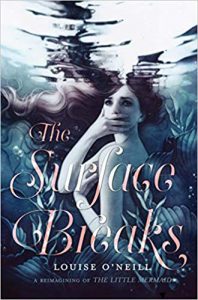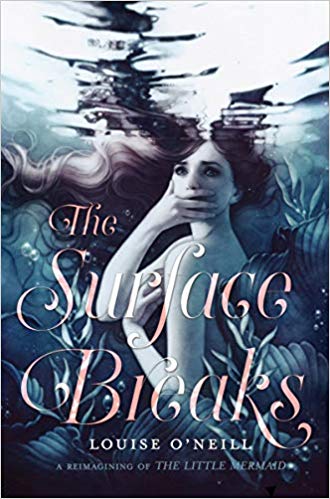 With The Surface Breaks, Louise O’Neill has reimagined the story of The Little Mermaid, while looking through a feminist lens. This fractured fairy tale follows of Hans Christian Andersen’s original plot line with variations typical of a reimagined tale.
With The Surface Breaks, Louise O’Neill has reimagined the story of The Little Mermaid, while looking through a feminist lens. This fractured fairy tale follows of Hans Christian Andersen’s original plot line with variations typical of a reimagined tale.
O’Neill’s story features Princess Muirgen, a curious mermaid whose mother named her Gaia. This name has influenced her curiosity for earthly things. Now that she is fifteen, Muirgen will be allowed to visit the surface rather than remain confined by her watery world. She is eager for this trip since she hopes to find answers about her mother’s disappearance. Muireann vanished on Muirgen’s first birthday, and the Sea King has told his daughters a narrative of abandonment, human capture, and disloyalty.
Not content with beauty, wealth, and status, Muirgen desires happiness, too. She only feels complete when she is singing. To discover her “happily ever after,” Muirgen is eager to escape the constricting and abusive attention of Zale, a man many years her senior to whom she will be bonded because her father wills it. She also wishes to escape her father’s scrutiny and his narrow views. Muirgen’s voice and beauty have brought her favor in her father’s eyes, but his obsession with blood purity and sameness, and his declaration that those unlike the mer-folk, those not born of the sea, and those who deviate from the Sea King’s standard of perfection are an abomination, considered less-than or misfits. The Sea King preaches about maids meeting standards for beauty, attentiveness, respect, and silence. She wonders whether those with differing inclinations are really perverted and unnatural and whether happily ever after is only for girls who do as they are told.
When Muirgen breaks the surface, she doesn’t discover the unsafe and despicable world described in childhood stories. Instead, she feels the sun, hears music, and is drawn to earthly attractions. Here, she encounters Oliver, saving his life during a shipwreck and a storm. Oliver represents the possibility of love, of something more than a life under the sea has to offer. Despite her grandmother’s warning that love is a “nymph-tale” and telling her that it doesn’t do a woman any good to ask too many questions or to want too much, Muirgen isn’t easily deterred.
To satisfy her desire, her quest for happiness, and her thirst for answers, Muirgen dares to journey through the Outerlands and into the Shadowlands to visit the Sea Witch, Ceto, who reveals many truths. Among those truths, Muirgen learns that men have invented the term witch for all women who are not afraid of them and who are loud, demanding, or refuse to do as they are told. She also learns that men who are not allowed to be afraid become angry, vicious, and feral. Convinced that her life and her need to know the mysteries of her mother’s disappearance depend on her joining the human world, Muirgen bargains with Ceto, making immense sacrifices to pursue her insatiable desires.
In the human world, Muirgen is taken in by the Carlisles, whose servant Daisy befriends and cares for her. Oliver’s mother, Eleanor Carlisle, reveals that there is a price to pay for beauty, that it is better to be interesting, smart, and funny. “Beauty fades, there’s no loyalty in it. My mother told me it would be better to cultivate my wit, my intelligence. . . . A woman needs to be strong to survive,” (225), Eleanor tells Muirgen, who is known as Grace in the human world.
As Muirgen comes to know the difference between living true and living a lie, that living true takes courage, and women are not taught how to be brace but to obey the rules. Furthermore, powerful women are often threatening to insecure men. She also realizes that love is painful, harrowing, and foolish-making and that “that which we take for granted can so easily be taken away from us, if we do not remain vigilant” (299).
- Posted by Donna

